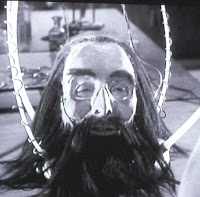 This film opens on what looks like a Parisan wharf with a lady of the evening and her pals dancing with various men until a voice yells, "Cut!" and we discover we're on a movie set. Tyrannical director John Gayle (Don Ameche) winds up working his French leading lady right into a nervous collapse, and when she announces that she's taking a six-month rest cure, JB, the studio boss, fires John and halts production, which bothers producer Doug Hyde (Willard Parker) who is also John's close friend. While at a carnival with his assistant Louisa (Janis Carter)—who is also his sister—John is impressed by a young performer he sees taking on the roles of Brazilian, Chinese and French dancers; when he visits her in her dressing area, he finds out that she's actually a rough-edged Brooklyn girl named Mary O'Leary (Dorothy Lamour). Soon, a plan develops: John will train Mary to take over the movie role, and he and Doug will pass her off as Rochelle, a legitimately French entertainer, to try and get JB to rehire John and finish the picture with "Rochelle" in the lead. But, of course, complications ensue: John falls in love with Mary, who finds him obnoxious, and she seems to be falling for Doug. Meanwhile John is still a hardass on the set and JB might still fire him. Louisa is the only one who really knows what’s going on.
This film opens on what looks like a Parisan wharf with a lady of the evening and her pals dancing with various men until a voice yells, "Cut!" and we discover we're on a movie set. Tyrannical director John Gayle (Don Ameche) winds up working his French leading lady right into a nervous collapse, and when she announces that she's taking a six-month rest cure, JB, the studio boss, fires John and halts production, which bothers producer Doug Hyde (Willard Parker) who is also John's close friend. While at a carnival with his assistant Louisa (Janis Carter)—who is also his sister—John is impressed by a young performer he sees taking on the roles of Brazilian, Chinese and French dancers; when he visits her in her dressing area, he finds out that she's actually a rough-edged Brooklyn girl named Mary O'Leary (Dorothy Lamour). Soon, a plan develops: John will train Mary to take over the movie role, and he and Doug will pass her off as Rochelle, a legitimately French entertainer, to try and get JB to rehire John and finish the picture with "Rochelle" in the lead. But, of course, complications ensue: John falls in love with Mary, who finds him obnoxious, and she seems to be falling for Doug. Meanwhile John is still a hardass on the set and JB might still fire him. Louisa is the only one who really knows what’s going on.This is an example of a rare breed: a classic-era musical from Columbia Pictures. And that's its main problem: there's no one thing that's really wrong with it, but it wasn't made by MGM, Warner Brothers or Fox, and is missing that extra intangible something that those studios' musicals had. The opening, the Paris street number, is fun and feels like a parody of AN AMERICAN IN PARIS, except that movie wasn't made until two years later. The songs are a notch above the off-brand musicals of the time, particularly the 30s standard "Let’s Fall in Love" by Harold Arlen. Until the plot stalls at about the one-hour mark, things move along nicely, and there are some cute lines: "He'll take it as hard as a Wisconsin winter"; "Sure, I'm as gay as May" (a reference, of course, to being happy); Louisa invents a new word, "Insinuenndo."
The bland acting doesn't help. In an MGM musical, the acting might not be much better, but you’d be distracted by the color and the general gloss of the production. This is in black & white and the general look is, well, not glossy, though it doesn't look cheap, either. I'm not a big fan of Lamour—she's serviceable here and does do a good job with all the accents she has to do. Ameche is awfully one-note as the jackass director. The supporting players are better: Willard Parker makes Doug such a nice guy, I was rooting for him to win the girl; I love Janis Carter and once again, I wish she was onscreen more often. Overall, it’s fun if not quite bubbly; I kept wanting Gene Kelly and Debbie Reynolds in the leads. [TCM]












